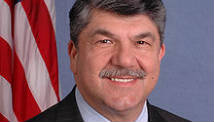Editor's note: Richard Trumka is president of the AFL-CIO. Christine Owens is executive director of the National Employment Law Project, an advocacy group for lower-wage workers.
(CNN) -- For the first time since the Great Depression, the U.S. Census Bureau tells us, middle-class family incomes have lost ground for more than a decade.
The sad truth is that the rewards for productivity and hard work such as health care coverage, retirement security, opportunity -- rewards that used to make America's workers "middle class" -- are on the rocks.
All the wage increases over the past 15 years have gone to the wealthiest 10%, according to the Economic Policy Institute. All of them. And almost all, 95%, of the income gains from 2009 to 2012, the first three years of recovery from the Great Recession, went to the very richest 1%.
Something else has happened, too. The bottom has fallen out of America's wage floor. And the erosion of the minimum wage has lowered pay and working standards for all of us.
 Richard Trumka
Richard Trumka  Christine Owens
Christine Owens An increase in the minimum wage -- which hasn't risen since 2009 -- is long overdue. If the minimum wage had just kept pace with inflation since 1968, it would be $10.77 an hour today instead of $7.25. For tipped workers, the rate's been stuck at a scandalous $2.13 for 20 years.
Congress is considering a proposal, called the Fair Minimum Wage Act, from Sen. Tom Harkin of Iowa and Rep. George Miller of California, supported by President Barack Obama. The act would raise the minimum wage over two years to $10.10 an hour and let it grow with inflation.
The Senate is expected to consider the proposal the week after Thanksgiving.
If the minimum wage had kept up with the growth of workers' productivity, it would be $18.67. And if it had matched the wage growth of the wealthiest 1%, it would be more than $28.
The share of workers in "good jobs" -- paying more than $37,000 a year and providing health care and retirement benefits -- has fallen, even though workers' average age and education level have grown. And today, most job growth -- and six in 10 jobs expected to be added over the next decade -- are in low-wage fields.
A raise in the minimum wage would give 30 million workers a little more money to pay for rent, food and other needs. But from other quarters, a different suggestion is on the table.
Publishing executive Steve Forbes, in a column appearing in the November 18 print edition of Forbes magazine, recommends that congressional Republicans go on offense about the minimum wage. He casts the issue as a partisan attempt to "put the GOP in the worst possible light" and advises a spin campaign to defeat a minimum wage increase.
Let's not allow America's lowest-wage workers to keep on falling further behind.Richard Trumpka and Christine Owens
Fortunately for America's working people, the public has a less cynical view.
A recent national survey conducted for the National Employment Law Project by Hart Research Associates finds that 80% of the public -- including 62% of Republicans -- support a minimum wage increase. Just 25% think that raising America's wage floor would cost jobs, a view that's also falling out of favor with economists. Raising the minimum wage does not result in job losses, respected academic research shows, even during bad economic times.
Ironically, Forbes' own magazine in July interviewed Carman Iverson, a 28-year-old minimum-wage McDonald's worker in Kansas City, Missouri, who has four children. The article detailed the utter impossibility of making ends meet on the wage, especially in an industry that limits workers' hours:
Iverson said she started working in 2012 at $7.25 an hour, and makes $7.35 an hour now after Missouri adjusted the minimum wage. She makes between $400 and $600 a month. Her rent is $650 a month.
When asked how she could pay her rent on those wages, she said she had a landlord who works with her. "I'm kind of on my last little leg, because I've been late on rent. I'm actually behind three months in rent.
"Sometimes I can pay it, sometimes I can't. I get paid twice a month, and both checks go to rent and the rest of it goes to utilities to the point where I don't have any money left to buy anything for my kids -- to buy them clothes, shoes or anything they need."
She said she manages to feed her four children on $543 worth of food stamps a month.
There's a lot Congress could do for Iverson and other low-wage workers to stop the erosion of wages and working standards for America's hard-working families -- from ending the job-killing budget cuts of the sequester to investing in the creation of good jobs.
But one choice is clear and easy and can make a difference right now: Raise the minimum wage, including the outrageous rate for tipped workers, and index it to inflation. Let's not allow America's lowest-wage workers to keep on falling further behind.
Follow us on Twitter @CNNOpinion.
Join us on Facebook/CNNOpinion.
{ 0 comments... read them below or add one }
Post a Comment